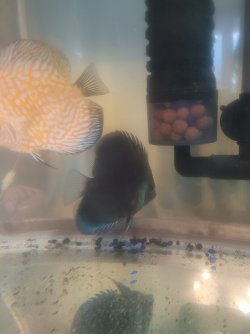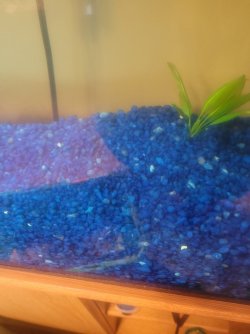Hello, I have a tank with some discus fish. Initially I had black gravel and no backing and my blue diamond turned very dark almost black himself. I have removed the black and and ordered a light blue background. I was wondering if I use the dark blue gravel I already have should he lighten up or will he stay black? Is it still too dark? I was hoping to save money and not to have to buy new.
🌟 Exclusive Amazon Black Friday Deals 2024 🌟
Don’t miss out on the best deals of the season! Shop now 🎁
You are using an out of date browser. It may not display this or other websites correctly.
You should upgrade or use an alternative browser.
You should upgrade or use an alternative browser.
The fish was highly stressed by the black substrate. Darkening their body colour is a response to stress, and fish over a black substrate frequently have this problem. It is for example very common with Corydoras. It is the fish's effort to blend in with the dark substrate so they are less conspicuous from above, but this causes them serious stress.
Blue is not at all natural, so it will likely have similar issues. Your best and cheapest option is quality play sand. You are in Ontario, so have a look in Home Depot or Lowe's for Quikrete Play Sand. It comes in a natural tan and a dark grey, stores seem to carry either one but not both, but either is fine. It is the softest and safest fish sand and a bag will cost around $6-8 dollars, it was $5.50 when I got mine a few years back. You can then use chunks of dark wood, dried leaves (oak is ideal), to add texture to the substrate and make the discus feel even more at home.
As for the background, black is without question your best bet. It will not have the detrimental impact on the fish like the substrate did.
Blue is not at all natural, so it will likely have similar issues. Your best and cheapest option is quality play sand. You are in Ontario, so have a look in Home Depot or Lowe's for Quikrete Play Sand. It comes in a natural tan and a dark grey, stores seem to carry either one but not both, but either is fine. It is the softest and safest fish sand and a bag will cost around $6-8 dollars, it was $5.50 when I got mine a few years back. You can then use chunks of dark wood, dried leaves (oak is ideal), to add texture to the substrate and make the discus feel even more at home.
As for the background, black is without question your best bet. It will not have the detrimental impact on the fish like the substrate did.
plebian
Fish Fanatic
This is complete nonsense. First of all, farmed Discus are raised without any substrate at all. Secondly, wild Discus inhabit forested areas that are devoid of sand. Although sand substrates do exist in some areas, those are the exception not the rule. Most substrates in the Amazon basin consist of mud and decaying plant matter. These substrates are closer in color to black gravel than than they are to play sand.The fish was highly stressed by the black substrate.
In my earlier years, black gravel was my substrate of choice. I kept several species of both African and South American species during those years. I never experienced what you have described.
It's clear the OP's Discus is experiencing stress, but it's absolutely not due to the color of the substrate. The OP doesn't mention what other inhabitants occupy the aquarium or the water parameters. Nor does the OP mention when the fish was purchased, whether it was quarantined, or when it was transferred to the aquarium. If it's been recently added it's likely still acclimating. It may have been carrying parasites or infected with a disease at time of purchase. It's also possible the lack of background is a source of disturbing reflections, or the lighting is too bright.
In short, there are a host of reasons, all of which are more likely sources of stress than the color of the substrate.
This is complete nonsense. First of all, farmed Discus are raised without any substrate at all. Secondly, wild Discus inhabit forested areas that are devoid of sand. Although sand substrates do exist in some areas, those are the exception not the rule. Most substrates in the Amazon basin consist of mud and decaying plant matter. These substrates are closer in color to black gravel than than they are to play sand.
In my earlier years, black gravel was my substrate of choice. I kept several species of both African and South American species during those years. I never experienced what you have described.
It's clear the OP's Discus is experiencing stress, but it's absolutely not due to the color of the substrate. The OP doesn't mention what other inhabitants occupy the aquarium or the water parameters. Nor does the OP mention when the fish was purchased, whether it was quarantined, or when it was transferred to the aquarium. If it's been recently added it's likely still acclimating. It may have been carrying parasites or infected with a disease at time of purchase. It's also possible the lack of background is a source of disturbing reflections, or the lighting is too bright.
In short, there are a host of reasons, all of which are more likely sources of stress than the color of the substrate.
This response shows you do not understand the issue. You cannot re-programme the species' genetics so you have to accept things as the science makes them clear. Fish do darken over a black substrate because they are attempting to blend in because that is in their genetics, and it causes stress. Fish over bare glass bottom tanks also have stress issues. Ask any knowledgeable biologist.
Last edited:
plebian
Fish Fanatic
Please ignore Byron. He tends to obsess over inconsequential things.Hello, I have a tank with some discus fish. Initially I had black gravel and no backing and my blue diamond turned very dark almost black himself. I have removed the black and and ordered a light blue background. I was wondering if I use the dark blue gravel I already have should he lighten up or will he stay black? Is it still too dark? I was hoping to save money and not to have to buy new.
I may be able to help you but you need to provide more information:
How long have you had the Discus and how many?
How old are they? If you don't know their age, how big are they?
Are you keeping other fish with them? If so, what kinds and how many of each?
Water temperature?
How long has your aquarium been functioning?
How large is your aquarium?
BTW - You wasted your money purchasing new gravel.
Similar threads
- Replies
- 17
- Views
- 900
- Replies
- 54
- Views
- 2K
- Replies
- 28
- Views
- 729



